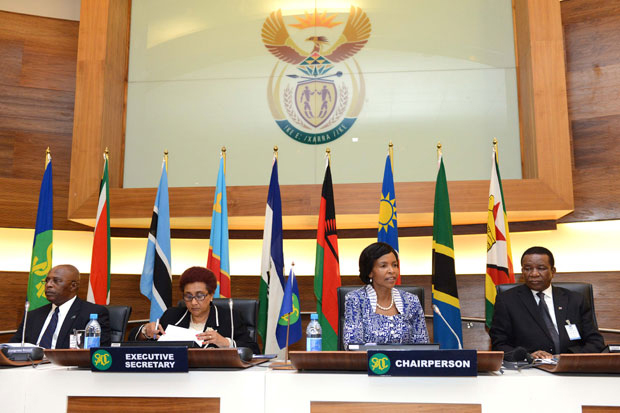First published by ISS Today
Leaders of the Southern African Development Community (SADC) will meet in Windhoek next week for their 38th annual summit. South Africa is handing over the leadership of the organisation to Namibia, but will continue to be part of the Troika of former, current and future SADC chairs.
Of the 16 SADC countries, South Africa has by far the largest economy. It is technologically the most advanced and has the third largest population (56 million). The Democratic Republic of the Congo (DRC) is the most populous country with around 80 million.
Projections of global power capabilities among SADC countries using the International Futures (IFs) forecasting tool show that by 2040, Angola will be the only country that approaches South Africa, but that the latter will still wield more power potential. The only other country in SADC that will come close to these two heavyweights is Tanzania, largely because of rapid population growth.
 Source: IFs version 7.34
Source: IFs version 7.34
These projections use the Global Power Index in IFs that includes military capacity, demographics, international interactions, technology and economic size in its formulation.
Some countries however wield extensive “soft power” – defined as the capacity of states to influence other states through means beyond just military might. This often includes economic, diplomatic or cultural influence.
A plan has started emerging in SADC in which regional “champions” or “locomotives” are identified to drive certain issues and ensure a more equitable partitioning of roles. This is similar to the African Union (AU) trend that identifies, for example, ‘champions’ for AU reform (Rwanda’s President Paul Kagame), corruption (Nigeria’s President Muhammadu Buhari) or intra-African trade (Niger’s President Mahamadou Issoufou).
The allocation of country-specific responsibilities to drive certain issues in SADC isn’t new. It was first introduced by SADC’s predecessor, the Southern African Development Coordination Conference. Since the creation of SADC in 1992, certain countries have stood out when it comes to wielding influence in decision making.
Zimbabwe’s former president Robert Mugabe managed to steer the regional bloc in his preferred direction several times. The current two-legged structure of SADC, with a fairly strong Organ on Politics, Defence and Security Cooperation, is partly due to Mugabe.
In 2010, Mugabe also managed to convince states to effectively shut down the SADC Tribunal, based in Windhoek, after it ruled in favour of Zimbabwean farmers when their land was expropriated.
Angola, the outgoing chair of the organ, has played an important role in the current deployment of a mission to Lesotho. It is also trying to help solve the DRC crisis.
Several other countries are driving certain sectors of the region’s Revised Regional Strategic Indicative Development Plan (2015-2020). Namibia is for example seen by the SADC secretariat as a “champion” of gender main streaming in the region – one of the cross-cutting issues identified in the plan.
Mauritius, with one of the smallest populations in the region, has one of Africa’s most vibrant economies. It is seen as an example of good governance and how to attract investors with limited resources. The island state could therefore be given the responsibility of “productive competitiveness” – one of the aims identified by the revised development plan under its first priority area: industrial development and market integration.
To implement such an allocation of responsibilities there are at least three issues to look out for. First, the secretariat, based in Gaborone, would have to be strengthened to oversee implementation. Plans have been in place for years to reform the secretariat, notably with the SADC We Want initiative, which is partly driven by civil society.
The secretariat itself has also been driving a self-financing agenda, similar to the AU’s effort to wean itself from donor funding. Just over 40% of the secretariat’s budget of $72-million (2017) is funded by donors. Programmes – with the exception of peace and security efforts – are also mostly donor-funded. This dependency often leads to a lack of ownership and buy-in by member states.
More fundamentally, the SADC secretariat has few independent decision-making powers compared to the AU Commission in Addis Ababa. It remains an administrative body that carries out decisions taken by the leaders of member states at their summits.
The second challenge is that some SADC members belong to more than one Regional Economic Community (REC). For example, the DRC and Angola belong to both SADC and the Economic Community of Central African States, and Tanzania also belongs to the East African Community. For countries with many domestic priorities, there’s often little capacity to devote to their role in one REC, let alone two or three.
Finally, SADC should consider the long-term viability of certain roles. The AU’s “champions” are largely personality-driven, but leaders in democracies come and go. Over the short term, political leaders can also radically change direction and a country’s power and influence can quickly wane. The allocation of roles should therefore be based on long-term trends and capabilities.
Given South Africa’s dominant position, nurturing partner states in SADC to play a greater role will be its challenge going forward. Strong cooperation between all member states is needed for SADC to succeed. So too is an institutional structure independent of the role of heads of state. DM
For more on South Africa’s role in the region, join the ISS seminar tomorrow, 8 August: Can South African foreign policy drive change in SADC?
Liesl Louw-Vaudran is an ISS Consultant




 Source: IFs version 7.34
Source: IFs version 7.34